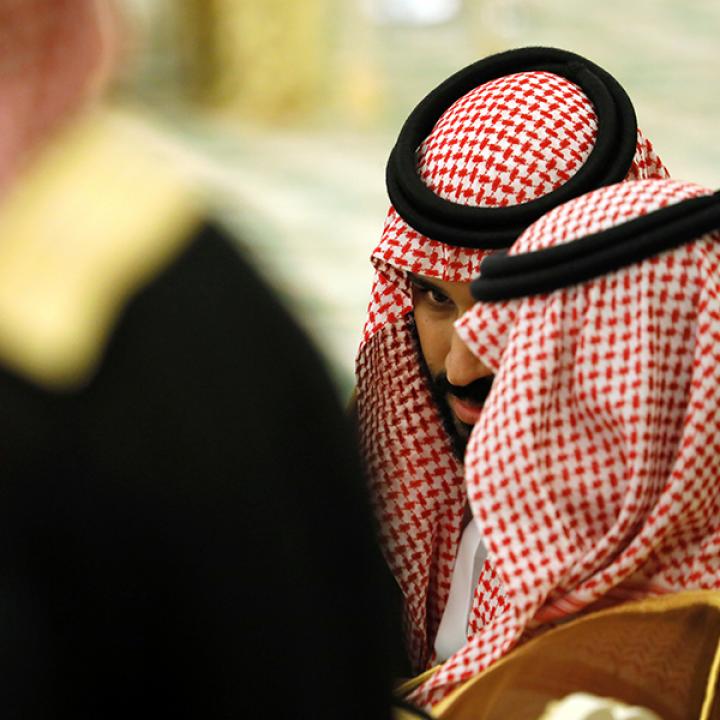
- Policy Analysis
- Policy Alert
Saudi Arabia’s ‘Black Swan’ Policymaking

Riyadh’s allies need to adjust more to the kingdom’s dynamic decisionmaking, once noted for being slow and cautious.
In the almost four years since King Salman ascended to the throne, Saudi policy initiatives attributable to his son Muhammad bin Salman (MbS) have been rapid, surprising to outsiders, and considerably significant. They can almost be described as “black swans,” defined as “an unpredictable or unforeseen event, typically with extreme consequences.” One could argue that the challenges the kingdom faces necessitate sharp changes, but many of the new policies have nonetheless been unexpected.
Domestic examples:
- Imprisoning over 200 princes and businessmen in the Riyadh Ritz-Carlton hotel on charges of corruption.
- Announcing a partial sell-off of the state-owned oil company Saudi Aramco, since postponed.
- Lifting restrictions on public entertainment (e.g., theaters) and mixed-sex audiences.
- Suggesting the construction of new resorts with “international standards” to encourage foreign tourism, implying alcohol and mixed swimming areas.
- Giving women the right to drive.
- Advocating a more moderate form of Islam and dismissing preachers who challenge the government’s new line.
Foreign policy examples:
- The March 2015 intervention in Yemen’s civil war, which strained the Saudi budget and developed into an international humanitarian concern and reputational issue.
- The January 2016 execution of Saudi Shia preacher Nimr al-Nimr, which resulted in a mob storming the Saudi embassy in Tehran and the consequent breaking of diplomatic relations between the two countries.
- The June 2017 Saudi-led rift with Qatar, which led to the cutting off of land and air links, damaging U.S. efforts to show a common front with its Gulf Arab allies against Iran.
- The November 2017 forced resignation of Lebanese prime minister Saad Hariri while he was in Riyadh, which was rescinded a month later when he returned to Beirut.
- The August 2018 crisis in relations with Canada, which was prompted by a government tweet expressing concern about human rights in the kingdom, resulted in the expulsion of the Canadian ambassador, suspension of Saudi air flights, and withdrawal of Saudi students residing there on government scholarships.
- The October 2018 killing of dissident journalist Jamal Khashoggi in Turkey. Although debate continues over who was responsible for ordering and planning the murder, the list of suspects includes close associates of MbS, and the incident has already had major consequences for the kingdom regardless of who is ultimately implicated.
While surprising at the time, these examples were, in retrospect, understandable and even signaled in advance from a Saudi point of view. As such, the kingdom’s allies and foes should consider what other decisions of consequence MbS may make in the future, perhaps reassessing events previously judged to be low-probability.
Domestic possibilities:
- Further narrowing of the wider royal family’s role in the kingdom, including limits to its influence over policy and succession.
- Putting more restrictions on freedom of expression.
- Taking tougher action against individuals or groups who criticize government policy, such as the possible execution of dissident Sunni cleric Salman al-Ouda, who is currently on trial and for whom prosecutors have demanded the death penalty.
Foreign policy possibilities:
- Publicly endorsing the yet-to-be-published U.S. plan for Israel-Palestinian peace, perhaps including a meeting between MbS and Israeli prime minister Binyamin Netanyahu.
- Going the opposite route and outright condemning the U.S. peace initiative.
- Deepening oil ties with Russia.
- Purchasing major Russian weapons systems such as S-400 surface-to-air missiles.
- Purchasing Russian or Chinese nuclear plants instead of U.S. technology, possibly unencumbered by restrictions on enrichment or reprocessing.
- Overtly collaborating with Pakistan on nuclear weapons.
- Intervening in Oman to secure the country’s future after the passing of Sultan Qaboos bin Said, who is unwell, or in Qatar to force the abdication of Emir Tamim al-Thani.
- Demanding a land corridor or oil export route across Yemen or Oman to the Indian Ocean.
Whether Saudi Arabia enacts any of these policies or comes up with other surprises remains to be seen. Despite his father’s continued presence on the throne and the ongoing fallout from the Khashoggi incident, MbS is still the kingdom’s main decisionmaker, and his disruptive leadership style is, for better or worse, considerably different from that of his predecessors. Analysts and decisionmakers should be prepared for what was previously unexpected: the crown prince’s “black swans.”
Simon Henderson is the Baker Fellow and director of the Bernstein Program on Gulf and Energy Policy at The Washington Institute. Assaf Orion, a retired Israeli brigadier general and defense strategist, is a visiting military fellow at the Institute.




